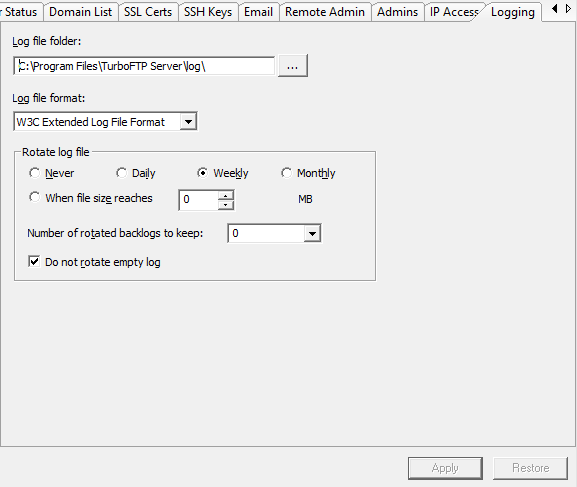Logging tab
The Logging tab contains settings for the server logging, which apply to all domains in the server.

Log file folder
The Log file folder can be edited only if the log file format is W3C Extended Log File Format or NCSA commands format, otherwise it will be grayed out. If it is editable, a valid directory is required, click the browse button to select a valid path.
Note: Change of server log path only takes effect after TurboFTP Server daemon service is restarted.
Log file format
Click the button to choose either Extended Log File Format, NCSA commands format, or No logging as the log file format.
Rotate log file
Select one of the five types (Never, Daily, Weekly, Monthly, or When the file size reaches) as the Remote log interval. When "When file size reaches" is selected the field must contain an integer between 1 and 65535.
Number of rotated backlogs to keep
Select one integer from the drop-down menu to decide the number of rotated log files to keep.
The rule of naming backup logs:
Backup logs are named as access_log[count].log, like access_log1.log, access_log2.log, etc. (or ssh_log1.log, etc., for SFTP service). TurboFTP Server will always try to use a [count] that is not larger than the current 'Number of rotated backlogs to keep' (backlog_to_keep) value. For For example, when backlog_to_keep is 4, the current number of log files is 4, and we have the following log files in the domain's log folder:
access_log1
access_log2
access_log3
access_log5
where access_log5.log, the oldest ([count] larger than backlog_to_keep may be caused by the change of backlog_to_keep setting), then at the time of rotation, access_log5.log is to be deleted, but the rotated log should be renamed to access_log4.log, keeping the [count] value less or equal to backlog_to_keep.
Do not rotate empty log
When this box is checked, empty log will not be rotated.